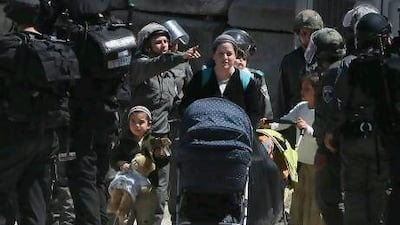JERUSALEM // Palestinian negotiators are prepared to drop one of two key preconditions for the resumption of peace talks with Israel if the government of Prime Minister Benjamin Netanyahu agrees to halt all settlement construction in the West Bank and East Jerusalem, a top Palestinian official said yesterday.
Nabil Shaath, a member of Fatah's Central Committee, said the Palestinians would give up their demand that any negotiations with Israel take place on the basis of borders that existed prior to the 1967 Arab-Israeli war. In exchange, he said, Mr Netanyahu's government must end settlement building.
"If they just stop all settlements, we'll go back to negotiations tomorrow," Mr Shaath told The National in a telephone interview. "If they just announced a total cessation of settlements, we'd go back."
There have been no substantive Palestinian-Israeli talks since December 2008. But with the Israeli premier reportedly poised to call on Palestinian President Mahmoud Abbas to restart talks as he prepares to face elections later this year, Palestinian officials appeared keen yesterday to seize momentum rather than be cast by Mr Netanyahu as resistant to talks.
It was not immediately known whether the Palestinian willingness to forego the pre-1967 borders demand was the result of pressure from the United States or other outside powers.
Until now, it has been a firm Arab position that any comprehensive and permanent peace in the region should be based on full Israeli withdrawal to the borderlines that existed prior to the 1967 war. It was in the wake of that war that Israel occupied and later annexed land in Jerusalem and the West Bank.
Daoud Kuttab, a Palestinian analyst, said Mr Shaath's declaration yesterday could represent a significant concession.
He doubted, however, that Israel would reciprocate by halting settlement growth, especially in East Jerusalem, where there has been a flurry of construction starts on new settlements. Any suspension of such building would raise the ire of Mr Netanyahu's pro-settler cabinet partners.
"I doubt it would get much traction," Mr Kuttab said by telephone. "My personal judgment is that given the current situation, negotiations would have to be done privately, not publicly."
Mr Netanyahu's invitation to Mr Abbas to restart talks will express his desire to discuss all core issues, including borders, security, refugees, water, settlements and Jerusalem, Israel's Haaretz newspaper reported yesterday.
The newspaper said the invitation, set forth in a letter, would also affirm Mr Netanyahu's willingness to resume the informal Israel-Palestinian dialogue held in Jordan earlier this year.
Jordan's King Abdullah II and the "Quartet" - the US, European Union, Russia and the United Nations - sponsored five rounds of those exploratory talks, but Israeli and Palestinian negotiators failed to find enough common ground to renew formal negotiations.
Mr Netanyahu's letter was said to have been drafted in response to a similar missive being prepared for the Israeli leader by Mr Abbas. Although the details of that letter's content have not been publically disclosed, there is concern in Israeli circles that that the Palestinian leader could threaten to dismantle the Palestinian Authority due to lack of progress in the peace process.
Mr Shaath did not comment on the contents of the Palestinian letter, but he derided Mr Netanyahu's demand that the Palestinians recognise Israel as a Jewish state.
"We never asked for recognition as an Islamic state like they are asking us to recognise them as a Jewish state," Mr Shaath said.
At a news conference on Tuesday, Mr Netanyahu explained his talks bid as an attempt by his government "to reach a settlement with the Palestinians, because I don't want a two-nation state. I also want to ensure the survival of a Jewish state".
This latest plea for negotiations comes ahead of parliamentary elections later this year. The campaign will see Mr Netanyahu's right-wing, pro-settler party face off against his primary opposition party, Kadima, led by its new leader, Shaul Mofaz.
With surveys of eligible Israeli voters consistently showing that a majority support the peace process and negotiations with the Palestinians aimed at two-state solution, Mr Netanyahu's taste for aggravating the Palestinians by approving expansions to Jewish settlements in occupied East Jerusalem and West Bank is a potential liability.
hnaylor@thenational.ae

